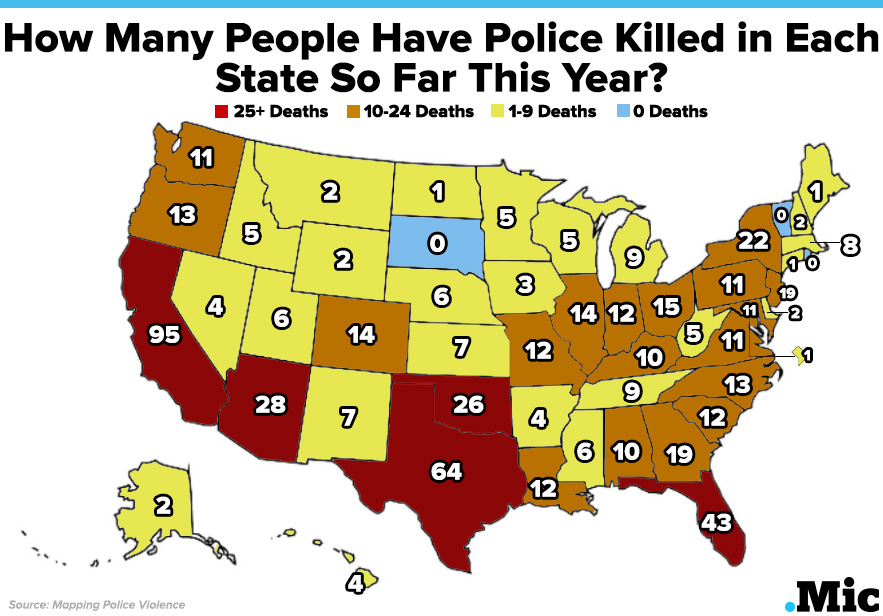
Mic
Just three states (Rhode Island, South Dakota and Vermont) avoided any killings at all. Meanwhile, California reached a shocking 95 police killings, Texas clocked 64 and Florida was not far behind with 43. Arizona and Oklahoma are runners-up at 28 and 26, respectively.
Keep in mind the year is only halfway over. Even the 605 killings that Mapping Police Violence tracked through July 10 alone would make the U.S. an outlier among comparable democracies.
This doesn't happen in other developed countries: Policing in the U.S. is controlled largely at the state and local levels, meaning that training, equipment and use-of-force standards vary wildly. But compared to many other countries, American police enjoy relatively lax guidelines on when and how they can use lethal force.
According to the Washington Post, in Britain, Iceland, Ireland, New Zealand and Norway, most police tend not to carry firearms at all while on duty. German police are extensively trained to understand that drawing and firing their weapons is a very serious matter of last resort.
On the other hand, an Amnesty International analysis found laws regulating when and why police are allowed to kill someone in each of the 50 U.S. states fall far short of international standards. In a statement on Amnesty's website, executive director Steven W. Hawkins said, "The fact that absolutely no U.S. state laws conform to this standard is deeply disturbing and raises serious human rights concerns. Reform is needed and it is needed immediately. Lives are at stake."
"Progressive" California, leading the way. Californians must be so proud.
ReplyDelete"More guns less crime"
ReplyDeleteAn interesting rage Mike considering that the leader in people killed by police is California which has strict gun laws and low percentage of gun ownership, one one of the states with no people killed by police is Vermont, a state with permissive gun laws and a high percentage of gun ownership. And as I mentioned in your post regarding police officers killed, Vermont also had low numbers of police officers murdered.
As for police use of deadly force, the acceptable use of deadly force used by police is pretty much the same standard as that for civilians, except that in some states civilians have a duty to retreat. In fact, law enforcement has always had the option to legally stand their ground.
It's also interesting to note the sharp difference in people killed by police in California, which is the highest in spite of their low gun ownership and its neighbor, Nevada, which has very permissive gun laws and very few citizens killed by police.
http://usliberals.about.com/od/Election2012Factors/a/Gun-Owners-As-Percentage-Of-Each-States-Population.htm
Funny how you guys love to talk rates instead of straight numbers except when it helps your argument.
DeleteWell Mike, you are the one that mentioned "more guns, more crime", so wouldn't the percentage of gun owners in a state be relevant?
DeleteMike, why don't you blame "mapping police violence" for presenting raw numbers instead of rates then? Or yourself for posting it.
DeleteFunny though, that California still edges out Texas and Florida when adjusted for population. They drop below Arizona though. That must be because of the loose gun laws that so many cops shoot citizens, while in California it must be because of "other factors". Is that about right?
Wouldn't Calif. with 33 million more people than MN be an important statistical consideration? Not according to SS. Just proving again what a fool he is.
DeleteQuite a record to hold.
ReplyDeleteSeems the gun loons have made America a third world country.
Well at least America is still number one in something.
It's the gun loons who cry more guns, less crime. Which means America should be crime free since we have over 300 million guns in America.
ReplyDelete